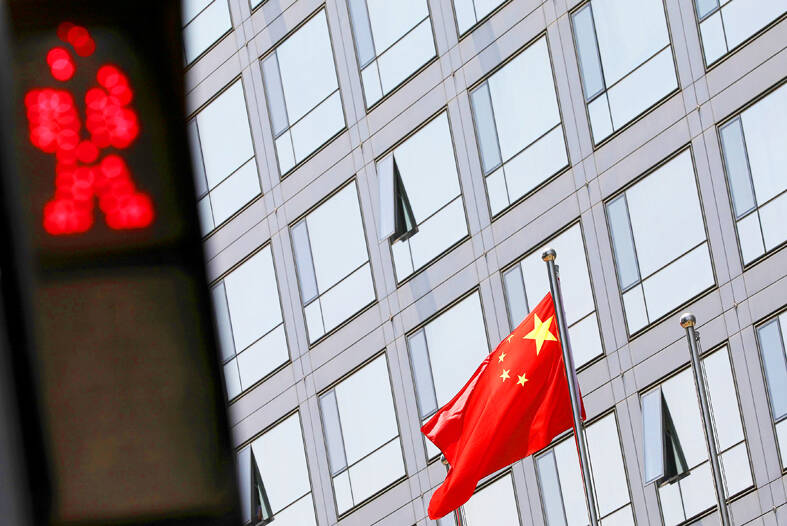Taiwanese firms had, in terms of book value, invested approximately NT$8.5 trillion (US$262.73 billion) in China and Hong Kong as of June 30, while 68 out of 700 Taiwanese companies that had explored business opportunities in China had 100 percent risk exposure, government reports showed.
China last month announced that it was auditing the taxes of Hon Hai Precision Industry Co (鴻海精密), known internationally as Foxconn Technology Group (富士康科技集團), sparking concern over the risks faced by Taiwanese firms with investments in China and Hong Kong.
Risk exposure is calculated based on the amount invested elsewhere compared with the net worth of the parent company, which represents the rights of the shareholders.

Photo: Reuters
Listed Taiwanese companies are expected to submit a quarterly report showing all funds wired from Taiwan, all funds wired and the dividends made, as well as the net quarterly profit or loss and total book value at the end of the quarter.
If the amount of investment in China exceeds the net worth of the parent company, it is considered overt risk exposure.
Of the 68 Taiwanese companies that exceeded 100 percent risk, 26 were listed as registered in the Cayman Islands or were foreign companies that were not listed abroad but were listed in Taiwan.
Disregarding companies registered in the Cayman Islands and companies whose parent companies had a net worth under NT$10 billion, there were 16 firms whose risk exposure in China exceeded 100 percent, with paper manufacturing company Longchen Paper & Packaging Co (榮成) topping the list with an overexposure rate of 165.98 percent.
Longchen Paper is China’s fourth largest paper manufacturer, with more than 20 subsidiaries. As of June 30, it had invested NT$11.8 billion in China, or more than 50 percent of the net worth of its parent company.
In second place was computer firm Clevo Co (藍天電腦), with an overexposure rate of 156.11 percent and investments of NT$63 billion.
Hon Hai had a net worth of NT$1.39 trillion, an overexposure rate of 117.12 percent and an end-of-quarter book value of NT$1.6 trillion. It had invested NT$203.8 billion in China.
Taiwan Semiconductor Manufacturing Co (台積電) with a total net worth of NT$3.18 trillion, had only invested NT$49.4 billion, and its exposure rate was 5.6 percent.
Ninety percent of Taiwanese firms invested via third-party intermediaries, with only 10 percent making a direct investment. Hon Hai, for example, made all of its investments via third-party intermediaries.
Statistics showed that funds wired to China from Taiwan exceeded NT$2.2 trillion, but if the investment capital was multiplied by the stakes held by Taiwanese businesspeople, the total value of Taiwanese funds wired to China exceeded NT$3.3 trillion.
From 1991 through the end of September, Taiwan approved 45,444 applications to invest in China, with total funds valued at NT$6.4 trillion, data from the Ministry of Economic Affairs showed.
However, the Chinese Ministry of Commerce said that up until the end of last year, it had only approved 120,000 investment applications from Taiwan, with total funds valued at NT$2.3 trillion.
Additional reporting by Fang Wei-chieh

STILL COMMITTED: The US opposes any forced change to the ‘status quo’ in the Strait, but also does not seek conflict, US Secretary of State Marco Rubio said US President Donald Trump’s administration released US$5.3 billion in previously frozen foreign aid, including US$870 million in security exemptions for programs in Taiwan, a list of exemptions reviewed by Reuters showed. Trump ordered a 90-day pause on foreign aid shortly after taking office on Jan. 20, halting funding for everything from programs that fight starvation and deadly diseases to providing shelters for millions of displaced people across the globe. US Secretary of State Marco Rubio, who has said that all foreign assistance must align with Trump’s “America First” priorities, issued waivers late last month on military aid to Israel and Egypt, the

France’s nuclear-powered aircraft carrier and accompanying warships were in the Philippines yesterday after holding combat drills with Philippine forces in the disputed South China Sea in a show of firepower that would likely antagonize China. The Charles de Gaulle on Friday docked at Subic Bay, a former US naval base northwest of Manila, for a break after more than two months of deployment in the Indo-Pacific region. The French carrier engaged with security allies for contingency readiness and to promote regional security, including with Philippine forces, navy ships and fighter jets. They held anti-submarine warfare drills and aerial combat training on Friday in

COMBAT READINESS: The military is reviewing weaponry, personnel resources, and mobilization and recovery forces to adjust defense strategies, the defense minister said The military has released a photograph of Minister of National Defense Wellington Koo (顧立雄) appearing to sit beside a US general during the annual Han Kuang military exercises on Friday last week in a historic first. In the photo, Koo, who was presiding over the drills with high-level officers, appears to be sitting next to US Marine Corps Major General Jay Bargeron, the director of strategic planning and policy of the US Indo-Pacific Command, although only Bargeron’s name tag is visible in the seat as “J5 Maj General.” It is the first time the military has released a photo of an active

CHANGE OF MIND: The Chinese crew at first showed a willingness to cooperate, but later regretted that when the ship arrived at the port and refused to enter Togolese Republic-registered Chinese freighter Hong Tai (宏泰號) and its crew have been detained on suspicion of deliberately damaging a submarine cable connecting Taiwan proper and Penghu County, the Coast Guard Administration said in a statement yesterday. The case would be subject to a “national security-level investigation” by the Tainan District Prosecutors’ Office, it added. The administration said that it had been monitoring the ship since 7:10pm on Saturday when it appeared to be loitering in waters about 6 nautical miles (11km) northwest of Tainan’s Chiang Chun Fishing Port, adding that the ship’s location was about 0.5 nautical miles north of the No.